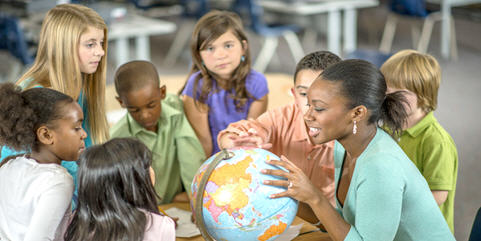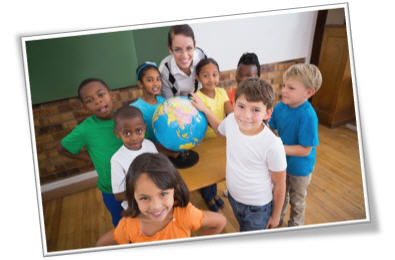Krisztina Varsányi - 07.02.2018 16:08
Lernst du gerne in einer multikulturellen Klasse? oder Würdest du gerne in einer solchen Klasse lernen?/ Do you like to learn in a multicultural classroom? or Would you like to learn in a multicultural classroom?
Livia Kurucz-Morvai - 13.04.2018 11:38
Hello everyone! Here is my article about what I think how it is to learn in a multicultural class.
How is it to learn in a multicultural class?
by Livia Kurucz-Morvai, VKS Växjö/Sweden
When I have moved to Sweden in 2014, I had to start in the Introduction program. There were students older than 16 and you have to start in the Introduction program if you moved to Sweden and can’t speak Swedish or you couldn’t start the high school because of your grades.
To learn in a multicultural class has advantages and disadvantages like everything. An advantage was for example I met people from different part of the world. They had different languages and cultures of course. We could discuss and share with each other how we think about different things. We could learn the other’s languages easier. I had many Arab classmates and I can’t speak Arabic. I know 10 words and the only reason for I know them because I studied in an international class for 2 years. I became more sympathetic and more open-minded.
A disadvantage was we couldn’t study in the same way. Some of my classmates didn’t go to school in their mother-country. So they didn’t have so much entry we from Europe had. The other disadvantages were that the most of my classmates spoke the same language so when they discussed something we couldn’t understand. When the teacher asked them to explain what they discussed in Swedish, they refused.
To summarize this short article and to answer Krisztina’s question yes, I liked to learn in multicultural class with its advantages and disadvantages. If I could do it again, I would definitely do it again. I want to recommend it to people who haven’t try it. I wish that I can send this “message” to more than the people who participated in the Erasmus+ project. I hope my message goes to more people when we will have our campaign.

Melina Thomzik - 13.04.2018 15:41
Hello,
I really enjoyed reading your article. I think that what you did sounds amazing. I like that in Sweden they have such a programme, of course it has its disatvanges but what kind of system doesn’t have any? I think students become so much more open minded, as you said and not only they also get a different view on different cultures or they even become in touch with other cultures. You can learn so much when you meet different people and differnt lifesyles. We don’t have such a concept on school, but of course I think you can’t get away without it at this stage, we have differnt cultures and students from different countries in my school and even in my class. For example I have a friend from Turkey. But I guess that is not the same, but it sounds so great what you did! I hope you got a lot of experiences and also a lot of friends, because you can never go wrong with an internatinal buddy.
Love from Germany,
Melina
Dóra Kirilly - 31.05.2018 16:18
Hello,
It was a really interesting article. If you meet different people, it opens your mind. In my primary school I had some similar experiences about the situation, because we had an Arab, a Vietnamese and some other classmates from different cultures. It was really interesting to see how they celebrate or just live their everyday life. It was so exciting to see that they are not different from us, but they have their own traditions, their own lifestyle, traditional dresses or food, that we have never seen before. I think it was a great experience to learn about them and it helped me to learn how to be tolerant and how we can accept each other without any preconceptions. I loved Erasmus project, because we were busy with different tasks in connections its topics for almost two years and this opportunity is unforgettable. I hope your message can reach everyone, because that is one of the most important things in the world.
Love from Hungary,
Dóri
Dániel Bosnyák - 07.06.2018 16:15
Hello everyone! I made an article about multicultural education.
Multicultural Education
Dániel Bosnyák, DNG Budapest/Hungary
Multicultural education is set of strategies and materials in education that were developed to assist teachers when responding to the many issues created by the rapidly changing demographics of their students. It provides students with knowledge about the histories, cultures, and contributions of diverse groups; it assumes that the future society is pluralistic. It draws on insights from a number of different fields, including ethnic studies and women studies, but also reinterprets content from related academic disciplines.
Multicultural education, also viewed as a way of teaching, promotes principles such as inclusion, diversity, democracy, skill acquisition, inquiry, critical thought, value of perspectives, and self-reflection. It encourages students to bring aspects of their cultures into the classroom and thus, allows teachers to support the child’s intellectual and social/emotional growth.

Multicultural education was found to be effective in promoting educational achievements among immigrant students. Thus, it is also attributed to the reform movement behind the transformation of schools. Transformation in this context requires all variables of the school to be changed, including policies, teachers' attitudes, instructional materials, assessment methods, counselling, and teaching styles. Multicultural education is also concerned with the contribution of students towards effective social action.